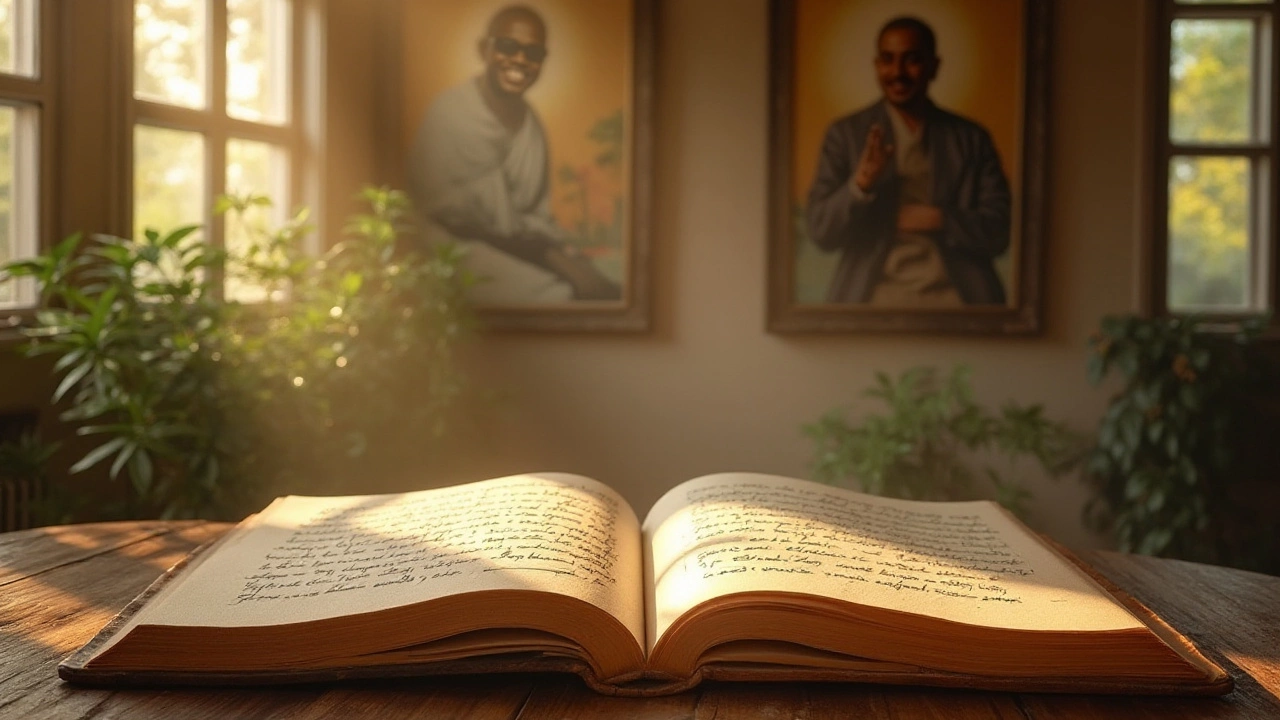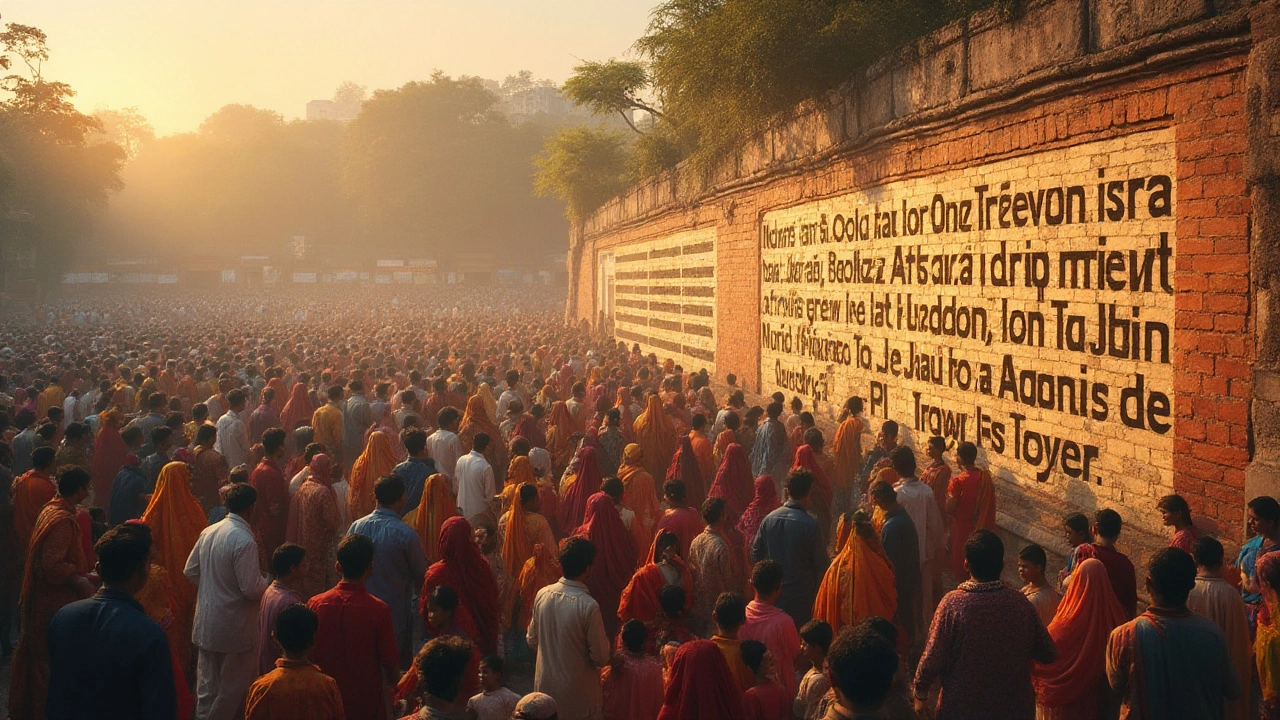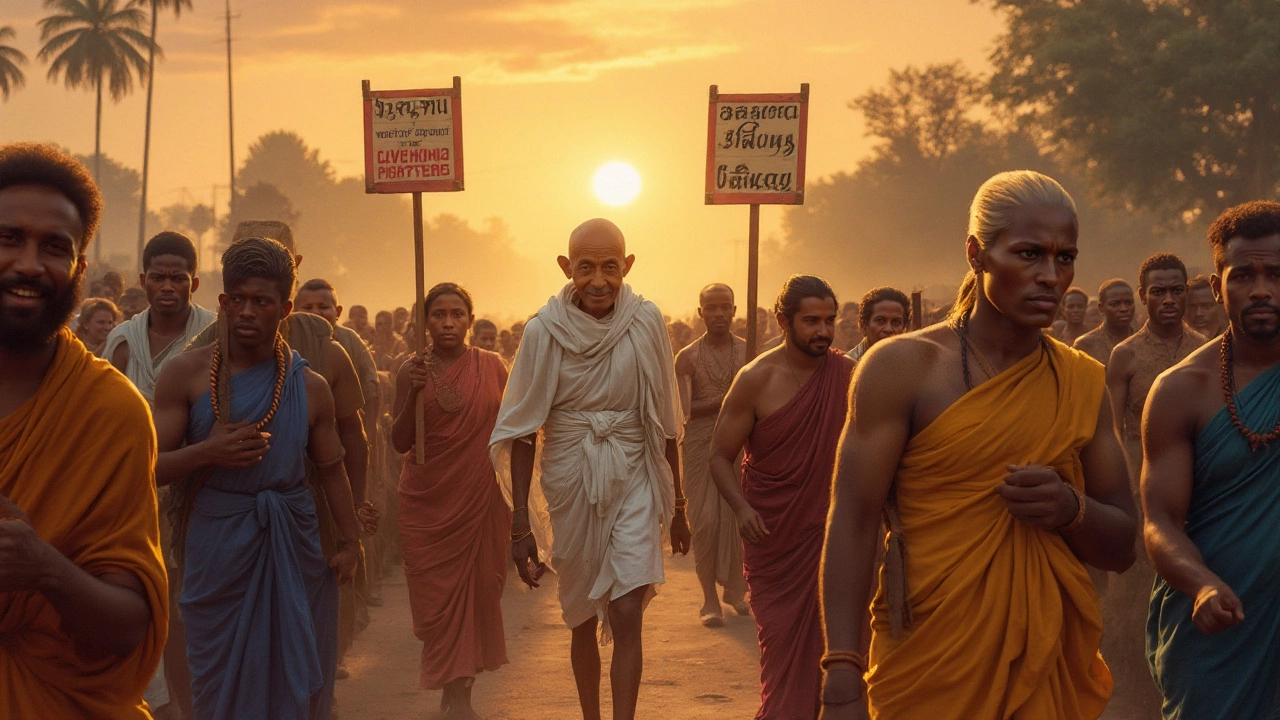Inspirational Indian Freedom Quotes: Voices of Liberty
 Nov, 30 2024
Nov, 30 2024
Quotes have a remarkable ability to capture moments in history, encapsulating the spirit of the times and inspiring generations long after. India's quest for freedom was fueled not just by action, but by the stirring words of its leaders. These words continue to resonate across the nation today, reminding us of the sacrifices made for liberty.
From the gentle persuasion of Mahatma Gandhi to the fiery resolve of Subhas Chandra Bose, their quotes reflect a profound wisdom and a relentless hope for a free India. These expressions are not merely remnants of history; they are continuous guides for us, echoing the values of courage, unity, and justice. As we delve into these quotes, we uncover a legacy that shapes the present and illuminates the path for future endeavors.
- The power of Indian freedom quotes
- Influence of freedom fighters
- Gandhi's eternal wisdom
- Nehru's vision for India
- Modern relevance of historical quotes
- Inspiring future generations
The Power of Indian Freedom Quotes
The transformative ability of quotes is undeniable, especially when they originate from a period as pivotal as India's struggle for independence. These freedom quotes from Indian leaders have an irrefutable power in shaping the minds and hearts of people, much like the rallying cry that unites a crowd into a movement. These weren't mere words but pledges that ignited the spirit of a nation determined to overthrow colonial rule. Such was their influence that they sustained the drive for freedom, motivating ordinary citizens to transcend their fears and partake in something larger than themselves.
Consider the words of Mahatma Gandhi, who once said, "Be the change that you wish to see in the world." This quote embodies not only a personal manifesto but a collective call to action, stirring individuals to lead by example in their pursuits for liberty. In a nation complex with diverse cultures and languages, these quotes provided a common language of resilience, courage, and hope. This unity of purpose was crucial to creating a cohesive movement across varied regions and communities, demonstrating how language itself could serve as a unifying force amid vast diversity.
The use of inspirational quotes often transcended the moment, serving as timeless wisdom for future generations. Jawaharlal Nehru, India's first Prime Minister, articulated a vision for the country's destiny when he said, "At the stroke of the midnight hour, when the world sleeps, India will awake to life and freedom." This statement not only marked the birth of an independent India but also set a tone of promise and responsibility. Nehru's words captured the essence of a nation poised on the threshold of new opportunities and challenges, ready to carve out its identity on the global stage.
The enduring power of these quotes lies in their ability to inspire not just political or social change, but personal transformation. They offered guidance during turbulent times and instilled a sense of duty and optimism. The resonance of these words can still be felt today in current discussions about democracy and governance. Modern leaders and activists draw from these historical utterances to frame their narratives, proving that the message of freedom is as relevant today as it was decades ago.
Looking at the role of these quotes in today's context, one can see their impact rippling through educational curriculums, democratic discourse, and popular culture. Schools in India often teach these quotes as part of history lessons, helping children understand the sacrifices and sentiments of freedom fighters. This practice keeps the legacy alive, ensuring that young minds cultivate respect for their nation's past while getting inspired to contribute positively to its future.
"Freedom is not worth having if it does not include the freedom to make mistakes." - Mahatma GandhiThe teaching and dissemination of such powerful quotes have become more accessible with digital media, allowing their reach to grow exponentially. Social platforms and media outlets regularly feature these historical statements, reaffirming their place in modern rhetoric. They serve as constant reminders of the values that shaped the identity of a sovereign nation, nurturing a culture of informed citizenship and active participation.
Influence of Freedom Fighters
Freedom fighters in India were not just catalysts of social and political movements, but also the voices that expressed the aspirations and grievances of millions. These individuals, through their powerful words and relentless commitment, awakened a nation's consciousness. The impact of these freedom quotes has been vast and enduring. Mahatma Gandhi, known as the Father of the Nation, wielded words as effectively as he did his philosophy of non-violence or satyagraha. One of his iconic statements,
"Be the change that you wish to see in the world,"encapsulates the profound simplicity and depth of his teachings, resonating with people striving for freedom and justice worldwide.
Subhas Chandra Bose, another fiery leader, invoked the spirit of sacrifice and valor through his famous call to arms. His phrase, "Give me blood, and I shall give you freedom," was more than a mere slogan; it was an electrifying appeal that mobilized countless individuals to lay down their lives for the cause of independence. Such words illustrated the fierce urgency and necessity of active struggle during times when peaceful means appeared to falter. His quotes continue to inspire courage and determination, particularly for those who advocate for aggressive action in the face of oppressive regimes.
Similarly, Jawaharlal Nehru, India's first Prime Minister, painted his vision of a free India with words that depicted both hope and challenges. In his famous "Tryst with Destiny" speech, delivered at the dawn of independence, he said,
"At the stroke of the midnight hour, when the world sleeps, India will awake to life and freedom."This message not only marked a pivotal moment in history but also served as a timeless reminder of the responsibilities entwined with independence. Nehru's writings and speeches provided a framework for India's future, emphasizing unity and secularism, elements crucial in a diverse nation seeking cohesion.
These iconic leaders and their inspirational quotes have crafted a narrative that extends beyond mere history lessons. Through their words, they infused the spirit of resilience and unity, which continues to guide contemporary movements for change. Today, their messages are revisited in classrooms, political arenas, and social campaigns, each time with renewed relevance. As the country faces new trials and tribulations, the timeless wisdom of these freedom fighters offers guidance and reassurance that liberty, once achieved, must always be vigilantly guarded.

Gandhi's Eternal Wisdom
Mahatma Gandhi, the father of the Indian nation, wielded words as his most potent weapon in the fight against colonial rule. His teachings were rooted in nonviolence and truth, and he emphasized these principles in his many inspirational sayings. Gandhi's quotes on freedom and liberty remain not just echoes of a bygone era but living principles that continue to inspire people globally.
One of his renowned quotes, "The best way to find yourself is to lose yourself in the service of others," embodies his philosophy of selflessness and dedication to greater causes. This quote is a reminder that true freedom comes from serving and uplifting those around us. Gandhi's ability to see freedom as a collective journey rather than an individual pursuit was instrumental in uniting diverse groups to achieve a common goal. These ideals made their way into homes, schools, and public discourse, moving millions to action during India's struggle for independence.
Gandhi's vision extended beyond political freedom; he believed in the economic and social empowerment of the people. He often remarked on the importance of 'swaraj,' or self-rule, a concept that went beyond the mere absence of foreign rule and encompassed self-governance, economic self-sufficiency, and self-reliance. A notable quote in this context is "Freedom is not worth having if it does not include the freedom to make mistakes." This sentiment highlighted the necessity of personal freedom and the understanding that growth often comes from learning through our errors.
"Be the change that you wish to see in the world." This famous quote, although often debated over its exact wording, is attributed to Gandhi and continues to serve as a powerful call to action for individuals worldwide. It urges people not to wait for others to initiate change but to take the first step themselves. This belief in personal accountability and the power of each individual to affect social change has become a timeless guidance, inspiring leaders and citizens alike to take responsibility for the betterment of society.
In education and social reform, Gandhi advocated for simplicity and humility. He often stressed that true education should be based on character building rather than material achievements alone. His passion for education is reflected in the quote, "Live as if you were to die tomorrow. Learn as if you were to live forever." Such insights continue to inspire educational systems around the world to value character and lifelong learning over rote memorization and exams alone. Gandhi’s teachings and words have gone far beyond India’s borders, influencing civil rights movements across the globe and underscoring the timelessness of his vision and wisdom.
Nehru's Vision for India
Jawaharlal Nehru, the first Prime Minister of independent India, was a visionary whose insight into the future helped lay the foundation of modern India. His idea of a free India was not just limited to political independence from British rule. Nehru saw a country that would stand strong on values of democracy, secularism, and scientific progress. He understood that for freedom to have meaning, every citizen needed the opportunity to contribute to their nation’s destiny. Nehru also emphasized the importance of unity in diversity, nurturing a society where various cultures, languages, and traditions thrived together in harmony. This vision for India guided many policies and influenced how the country's institutions were set up, ensuring they reflected these democratic ideals.
Education and industrialization were key components of Nehru's strategy. He was acutely aware that a country aiming to achieve true freedom needed a strong infrastructure and an educated populace. Institutions like the Indian Institutes of Technology and the Indian Institutes of Management were established during his tenure, marking the start of India’s journey toward becoming a global hub of knowledge and industry. Nehru's quote, "The policy of being too cautious is the greatest risk of all," highlights his belief in bold steps towards nation-building. His foresight in pursuing industrialization through initiatives such as establishing public sector enterprises laid the groundwork for economic development and self-sufficiency.
On the cultural front, Nehru encouraged the arts and literature, believing they were essential to nurturing a national identity rooted in rich heritage and contemporary creativity. He fondly envisioned an India where citizens could freely express themselves while being deeply rooted in a legacy of intellectual freedom. During his tenure, the iconic phrase "Unity in diversity" became more than a slogan; it was an ethos that drove policy-making and societal development. Nehru once remarked, "Culture is the widening of the mind and of the spirit," exemplifying his commitment to a society that embraced cultural differences as strengths rather than weaknesses.
Nehru's dedication to the vision of a free India was not without challenges. The country faced enormous obstacles, from partition pains to economic hardships. Yet, his diplomatic strategies and nurturing of non-alignment in the Cold War era emphasized an independent posture on the global stage. He advocated for peace and international cooperation, aware that India’s freedom was intrinsically linked with global peace. His substantial contributions continue to guide contemporary India, fostering a sense of confidence in the nation’s ability to navigate a complex world while holding dear the fundamental ideals of freedom.

Modern Relevance of Historical Quotes
In today's rapidly changing world, the historical quotes from India’s freedom fighters hold a remarkable relevance. These freedom quotes are not only echoes of a bygone era but serve as timeless beacons of guidance and inspiration. As we navigate through the complexities of modern-day India, these words remind us of the ideals on which our nation was founded. In many ways, the struggles of the past resonate with contemporary challenges, and the wisdom imparted by these historical figures can often provide a clarity of purpose that transcends time. From advocating non-violence amidst conflicts to upholding integrity in the face of corruption, the essence of their messages remains as significant today as it did during their times. The universal values of liberty, equality, and justice that these quotes represent continue to inspire actions within India’s diverse society.
Consider Mahatma Gandhi's timeless words, "Be the change that you wish to see in the world." This simple yet powerfully evocative quote underscores the personal responsibility we have in shaping not only our future but the world around us. Today, in a global society facing numerous socio-political issues, these words encourage us to take individual actions for the collective good. Similarly, Jawaharlal Nehru's vision articulated through his quote "At the stroke of the midnight hour, when the world sleeps, India will awake to life and freedom," speaks volumes. It embodies the promise of a new beginning, relevant even in modern times as India continually strives toward progress and development. Each of these quotes, while rooted in the past, holds profound meanings for present realities and aspirations for a better tomorrow.
The impact of these historical quotes extends to every generation, prompting introspection and motivation. As students engage with these quotes in their educational curriculum, they do more than recite historical texts; they connect with a vast legacy of ideas that advocate for individual effort, community solidarity, and national pride. These quotes serve not only as lessons in history but also as a connective tissue in society, bridging generational gaps and fostering a sense of shared duty and purpose. In modern discourse, these words are invoked to inspire acts of kindness, drive social movements, and reinforce democratic values. They remind us that our past struggles should inform our current endeavors and that the principles of freedom and equality are continuous pursuits.
Inspiring Future Generations
The legacy of freedom in India is sewn into the rich tapestry of its quotes, woven by leaders who lived and breathed the struggle for independence. These words are alive, echoing in classrooms, conversations, and individual hearts today. As a result, they ignite a spark for younger generations to appreciate the value of the freedom they often take for granted. The power of these inspirational quotes, like the roots of a mighty tree, runs deep and wide, offering guidance and resilience in times of doubt. Each quote is a testament to the vision and foresight of India's founding figures, urging the youth to cherish and uphold the democratic ideals envisioned by leaders like Gandhi and Nehru.
Integrating these historical freedom quotes into educational curricula provides a crucial link to the past. Young minds are thus offered a context for the liberties they enjoy today. Many schools in India initiate Annual Freedom Week, where students participate in debates, recitals, and plays centered around these words. This not only reinforces patriotism but also instills a deeper understanding of the sacrifices that underpin India's independence. Through interactive learning, students grapple with questions of ethical governance and civic duty, ensuring that these lessons are not just academic but profoundly personal.
A delightful anecdote emerges from a school in Bangalore, where students hosted a national quiz on India's freedom movement. An inspiring moment occurred when a student, deeply moved by Bhagat Singh's words, realized, “Revolution is an inalienable right of mankind. Freedom is an imperishable birthright of all.” These interactions highlight how historical wisdom continues to be relevant, challenging students to ponder what kind of legacy they wish to leave behind. In an age dominated by technology, such profound exchanges ensure that the essence of freedom remains vibrant and unyielding.
"At the dawn of history, India started on her unending quest, and trackless centuries are filled with her striving and the grandeur of her successes and her failures." - Jawaharlal Nehru
Besides academic settings, these quotes find their way into youth-led forums and grassroots activism. Young activists draw inspiration from the past, learning to nuance their responses to contemporary issues. Whether tackling environmental challenges or advocating for social justice, India's youth find strength in these indelible quotes. With globalization bridging cultures but sometimes obscuring native identity, such reminders of their cultural heritage equip them to voice their opinions confidently and compassionately on international stages. The transformation of these iconic words into social media campaigns has further empowered young Indians to connect with peers globally, fostering a community aware and appreciative of differences.